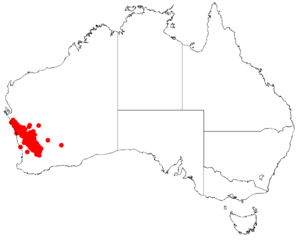Acacia acuaria facts for kids
Quick facts for kids Acacia acuaria |
|
|---|---|
| Scientific classification | |
| Genus: |
Acacia
|
| Species: |
acuaria
|
 |
|
| Occurrence data from AVH | |
Acacia acuaria is a type of shrub, a plant that's smaller than a tree. It belongs to the Acacia family, which is also known as wattles. This particular acacia is special because it only grows in Western Australia, meaning it is endemic to that area.
What it Looks Like
This Acacia is a rounded and prickly shrub. It usually grows to be about 0.6 to 5 meters (2 to 16 feet) tall. Its small branches are spiny and smooth, meaning they don't have hairs. It also has tiny leaf-like parts called stipules that fall off early.
Instead of true leaves, this plant has special flattened stems called phyllodes. These phyllodes are stiff, green, and have a strong smell. They can be 6 to 20 millimeters long and about 1 millimeter wide. They have a main vein that isn't very clear.
The Acacia acuaria blooms from June to September, showing off bright yellow flowers. These flowers grow in round clusters, with each cluster having 14 to 23 golden flowers. After the flowers, dark brown or black seed pods form. These pods are curved or coiled, growing up to 5 centimeters (2 inches) long and 3.5 to 5 millimeters wide. Inside, they hold small, oval-shaped seeds that are about 3 millimeters long.
Where it Grows
This Acacia is found naturally in the Mid West and Wheatbelt regions of Western Australia. You can find it from places like Northampton in the north to areas around Yilgarn in the south east.
It likes to grow in different types of soil on sandy plains, on small hills, and near salt lakes. It's often found as part of Eucalyptus woodlands or in areas with 'mallee scrub', which is a type of bushland with many-stemmed eucalyptus trees.

